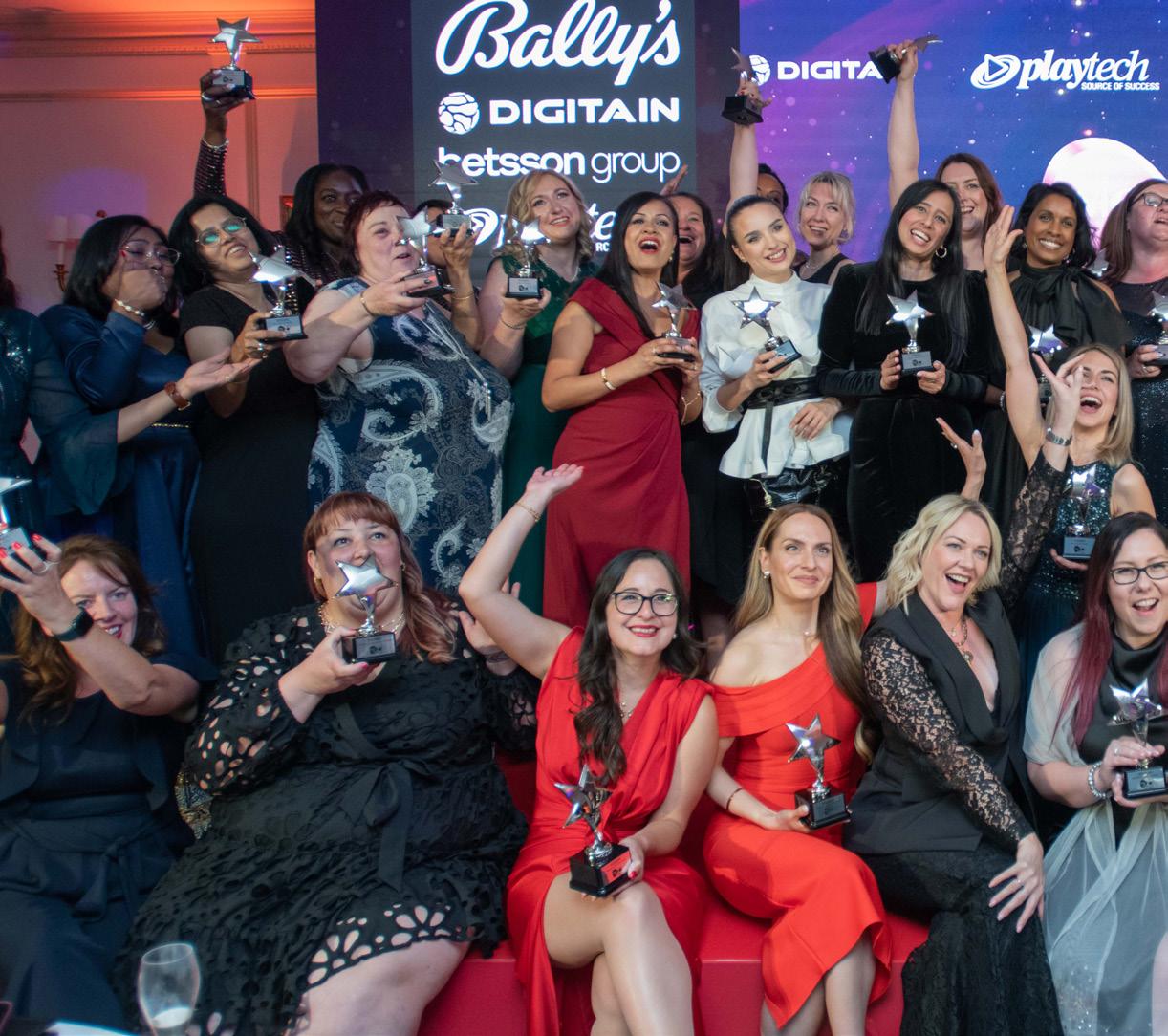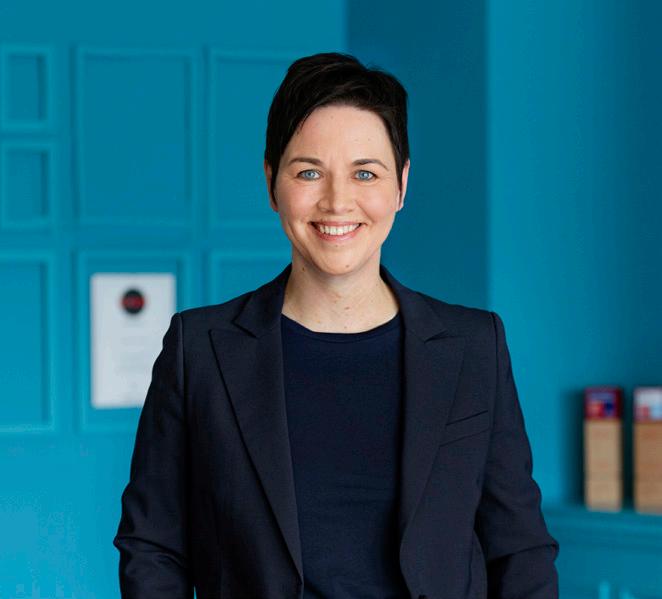




Opinion Disclaimer:










Opinion Disclaimer:





Lana Thompson - Editor
Post Edition From The LGC & WIG Diversity Build Up
Welcome to the latest edition of the Infinity Gaming Magazine and also the special feature for the 2025 London Gaming Congress (LGC) that took place on the 20th March at the iconic Savoy Hotel. Our first event and it went amazingly well, the feedback on panel discussions and the quality offered with insights made it now a staple each year and the 2026 LGC will be better and bigger with more innovations. Our team can’t wait to show you all what we have in store.
I want to personally thank everyone that took part in the discussions and all those that attended this first ever LGC, you made it a great event and so much look forward to seeing you all in 2026 for LGC2.
Over the coming months we will release videos of each session to show how special the LGC 2025 Was.
Now on to something a little more pressing, the 2025 edition of the Women in Gaming (WIG) Diversity Awards is fast approaching, indeed as I write this editorial our wonderful judges for 2025 will be reviewing the nominations and once again we have beaten all previous amount of nominations. I am told by our boffins that we are up some 6% from last year. The WIG as you all know is very close to my heart and an evening I so look forward every year.
The WIG Diversity is the oldest event celebrating and recognising the achievements of companies, teams and individuals in recognising and working towards a diverse and inclusion environment. We started back in 2010 and I am so proud that we continue to grow each year.
This is with the support of our great sponsors, this year they are Digitain, Pronet Gaming, Betsson Group, Playtech, Relax Gaming, IGT, Gamomat, Greentube, Light & Wonder and not least Soft2Bet.
We are so proud that many companies now see the WIG Diversity as an important event and a special thank you to Betsson our oldest and sponsor of the WIG Diversity, it means so much to us your support.
Enjoy they double header magazine and will be back with you next month celebrating all the finalists.
Enjoy this special edition of this magazine.
“To Infinity and Beyond!”
Regards, Lana The Editor
CONTACT US
Clever Duck Media Centrix@Keys
Keys Park Road
Staffordshire WS12 2HA UK Tel: +44(0)1543 478 889
PRODUCTION
Clever Duck Media Centrix@Keys
Keys Park Road
Staffordshire WS12 2HA UK
PUBLISHING
Infinity Gaming Magazine is operated by © Clever Duck Media Ltd ® Company Reg. No. 687 1018 (Registered in England) V.A.T reg. no 972 6372 91
Sponsorship Opportunities Colin@cleverduckmedia.com
Business Partnerships Svetlana@gaming-awards.com
Marketing & Advertising Maria@cleverduckmedia.com
Editorial Content & PR media@cleverduckmedia.com






FLAMING




The LGC is now established as a “Must Attend” event for the industry
The London Gaming Congress was one of the most significant events in the gambling sector, attracting professionals from various facets of the industry. Spanning a myriad of topics from regulatory frameworks to emerging technologies, the congress offered unprecedented opportunities for networking, learning, and collaboration. Here’s what attending this event covered and why for 2026 should be on your priority list:
T he London Gaming Congress served as a melting pot for industry leaders, and innovators. Attendees had the chance to interact with key figures from both the UK and European gaming landscapes.
M eet Influencers : All attendees engaged with decision-makers from major gambling companies.
E xpanded Your Network : Built relationships that can lead to future
collaborations or partnerships.
S hared Insights : Exchange of ideas and strategies with fellow attendees who share your interests.
D iverse Attendee Profile
T he event drew a wide range of participants, including:
O perators: Both online and landbased gambling operators were present.
S uppliers: Companies providing essential technology and services to the gaming industry.
Advisors : Discussed the leading technologies and innovations happening within the industry.
I nsightful Discussions and Panels
O ne of the highlights of the London Gaming Congress was the array of panels and discussions that delve into pressing issues facing the industry.
R egulatory Changes : AttendeesLearned about upcoming legislation and how it may impact their business.
Technological Advancements:
Gained insights into the latest innovations in gaming technology.
M arket Trends : Listened to shifting consumer behaviors and preferences.
E xpert Speakers
T he congress featured an impressive lineup of speakers, including:
R egulatory Experts: Heard from those who shape the laws governing the industry.
I ndustry Innovators: Learned from pioneers who are driving change in the gaming sector.
M arket Analysts: Understood datadriven insights into market dynamics.

The London Gaming Congress was held at the iconic Savoy Hotel, a luxurious venue located on the banks of the River Thames. This historic site is known for its elegance and central location, making it an ideal setting for such a prestigious event.
Accessibility: The Savoy is easily accessible via public transportation and is close to major attractions.
Comfortable Setting: All attendees enjoyed a comfortable and professional environment conducive to networking and learning.
Culinary Delights: Experienced exquisite dining options that the Savoy had to offer.
London: A Global Gambling Hub
The UK is recognized as one of the world’s leading gambling markets, mak-
ing London the perfect backdrop for this congress.
Vibrant Industry: With over 900 licensed online gambling companies, the UK is a bustling hub for gaming.
Economic Impact: The gambling industry contributes significantly to the UK economy, generating billions in revenue.
Cultural Attractions: Take advantage of your visit to explore London’s rich history and vibrant culture.
As the gaming industry continues to evolve, the London Gaming Congress will address key trends that are shaping its future.
Emerging Technologies: Explore the role of AI, blockchain, and VR in the gaming sector.
Regulatory Evolution: Understand how regulations are adapting to new technologies and market realities.
Consumer Expectations: Learn about shifting consumer preferences and how to meet them.
The London Gaming Congress promised and delivered to be an invaluable experience for anyone involved in the gaming industry. With its focus on networking, learning, and collaboration, the event is a unique opportunity to gain insights and forge connections that can drive your business forward.
Whether you are a seasoned professional or new to the industry, the congress offered something for everyone. Don’t miss out on the chance to be part of this pivotal event in the gaming landscape. Mark your calendars for March 2026, and prepare to immerse yourself in the future of gaming.
The London Gaming Congress (LGC) 2025 head from leadiers within the online gaming sector, taking part was Pontus Lindwall, Leigh Nissim and Walter Bugno
Below is the transcript from the panel discussion covering some of the topics covered
Where does the leadership panel see the industry heading in terms of expansion, or is it all South America at the moment is the focus, and will that be the focus for the next few years?
Pontus Lindwall (PL) : I t’s obvious that a lot of things are going on in Latam and a lot of things is happening there, but I don’t think as an industry that we will focus fully on that area.
We also have to focus a lot on what we have discussed before lunch here, which is getting the European regulators back on track, try to save the fraction of the industry
that we still have, which is regulated, and work with that. And by doing that, I think we can keep on growing the business also in Europe.
Leigh Nissim (LN): We have some experience working with a very fast-growth operator in Africa, and they seem to be achieving good growth in that market, quite a different market in terms of transaction volumes, go-to-market, even games mix is quite different. So there are other markets other than South America, but these gentlemen on my left and right, they will see m ore volumes and numbers on those different markets. Particularly, we have the privilege of
working with Betsson, and it’s an incredible business, and particularly on the casino growth side.
A s a public company, sometimes people don’t look at it, but honestly, when you look at it and you work with it, you’re like, oh my God, they do a brilliant job, because I’m really bigging you up now. I hope you don’t mind that.
B ut it’s serious, because we look at all these different businesses, we’re B2B. The thing we love about Betsson is it’s a multi-brand operator as well, so it adds a level of complexity that other global operators don’t necessarily have, like Bet365, which is more a single-

left and right are probably best to answer that specifically, but absolutely, being a global player is hard and a great opportunity. Yeah, lots of opportunity everywhere.
Walter Bugno (WB): Wherever Pontus goes. Quite seriously, they’re an important... You know, Betsson’s an important customer of Games Global, and of course we follow very closely the strategies of our core partners.
We’re a B2B provider, and we’re a B2B content provider, so what drives us are two things.
One is, of course, where our major customers are going, and as they progress and expand into new geographies, and Latam is one of
them, of course. The United States is another big one that’s accelerating. Africa is starting to regulate and expand, and that’s another big opportunity.
We also look at product, so it’s just not content to the gaming industry, but we see ourselves as a content provider, and so there are other opportunities of taking content into new markets and new segments, and so growth is not limited by geography only. It’s also limited by the scope of what your business is focussing on. But definitely Latam and America and Africa, to a certain degree, are the big opportunities right now from a geography perspective.
Will America start slowing down,
because there’s only a few more states to come online? Is that why people are more interested now in South America so much? Because everybody’s looking for expansion, aren’t they, to continue to grow?
WB: Well, firstly, again, let me put the perimeter around our business. We’re not into sports betting.
We’re not a sports betting content provider. As a result, the United States for us is really all upside. There’s only five states that have legalised iGaming, five serious states that have legalised iGaming.
Rhode Island has also legalised or regulated iGaming, but it’s a very small marketplace, and you really have to do the economics as to whether it’s worthwhile

today, 12 months after we’ve launched, our third largest geography.
And as a result, it’s an important market. Some of the topics of conversation this morning, which I found fascinating, by the way, the same challenges that are seen here are applicable over there. The legal or black market is huge in the United States.
The fringe market, the big topic of sweepstakes at the moment, is the biggest. At G2E in October, which is a land-based conference with iGaming tagged on, really, the biggest topic of conversation at G2E last year, last October, was sweepstake casinos. And that’s
moving very fast.
So the importance of regulation, the importance of trying to understand how to stamp out offshore operators coming in, it’s a big topic there, just like it is here. But America’s still got a long way to go. There’s lots of upside, and there’s a lot of protectionism in America.
The land-based casinos see this industry, the online industry, as a real cannibalising threat, and their lobbying is very strong.
With so many emerging markets in focus, what factors should operators consider when entering new territories to ensure
sustainable growth?
PL: First of all, the regulation. Does it help you contain sustainable growth? Because no company really wants to cannibalise their customers and finish them. So new markets, sustainable growth, what are the challenges there, Pontus? There’s a lot of challenges, and every single market is different from each other.
Some markets are more predictable than others, but I would say that the majority of the markets where we operate, and that’s not only the new market that we enter, but also all the markets are not very predictable
What does the regulatory stability look like? You were on that regulatory thing, especially Europe. Isn’t it maddening that it’s an EU state, but they don’t have the same regulations in each jurisdiction country? Do you think that will ever be a thing that will happen, that regulation across the EU will all be uniform?
PL: I don’t think that will happen. I think that was very clear early days in this industry, that the EU said that we’re going to let every member state do their own regulations and take care of their gaming industry by themselves, but they have to do that in an EU-compliant way, which they not always did.
LN: I think my angle is slightly different, in that I find it interesting that the industry has started to talk about sustainability, because the whole conversation has been about responsibility. As you see the word popping up more and more, but actually we don’t see that much evidence of companies focussing on sustainability. Certainly from a player sense, most of it is around risk management and protection of players.
Often when they’re at the end of their journey, and trying to detect them as early as you can, no one wants players who are playing with risk. So the whole industry is built up focussing on risk, and tries to do a very good job on it, and it’s very hard because you have a multitude of systems in different countries. We heard earlier the data is very fragmented and the like,
whereas Future Anthem takes a view that really to focus on true sustainability, you need to focus on the majority of your players, and how do you help them have a good entertaining experience regularly, where they spend within their budget, and they return and they have a positive playing experience.
It’s only when you’ve got the balance between positivity and negativity, that you get true sustainability. We don’t see many companies joining up their marketing operations, with their risk management usually compliance is over there, marketing is over there, they don’t join, and the data sets definitely don’t join. So I think that in itself, like that word sustainability, and how you drive sustainable revenues, will become a much bigger topic of conversation in the next phase, as people really think about retention, and the unit economics of player acquisition and player retention.
So for me the aspect that’s really interesting is the sustainability of these revenues, and these multi-jurisdictional complex environments, that operators, both B2B and B2C, have to operate in.
WB: I have somewhat of my own alternative view, which means that it’s neither right nor wrong. I think both topics of responsibility and sustainability are important. I think there’s a third word that is missing, and that is education. I think we are so conditioned by politicians coming into the space, for a very short period of
time, who tend to approach our industry with an appeasement mode. They’ll make certain decisions about forcing through regulations that are quite punitive in some cases, because they think that it sounds like it’s the right thing to do to garner support, and then they’re gone, and the next one comes in.
We need a process of education with the regulators. There needs to be a lot more conversation between all facets of the industry, which I think is still missing. It’s superficial, and it’s not treated with enough seriousness by government.
It’s not treated with enough seriousness by operators, and not all operators, some more, some less, and by providers to the industry. We need to make sure that when we make decisions, we’re actually doing a decision that helps achieve what the goal is. We heard today in the conversation before about the proliferation of the black market, and just because you change a rule at the top doesn’t mean that the black market goes away.
In fact, most decisions promote more activity in the black market. The affiliate discussion that was here today, which I found absolutely interesting, is the debate that they were having, and I hope people don’t mind, the members of that panel don’t mind me saying this, but I found it fascinating that the big debate was, should I, shouldn’t I cross the line in terms of supplying that market or not being part of that market. It was a very interesting debate, and we should never have
The black market, do you think there’s a danger that could grow more because of the regulations and sustainability and people self-removing themselves? Is there a danger that the black market can grow? In the UK, some of the operators are saying that. What’s your thoughts?
WB: I have no idea because I don’t think anyone knows how big it is, so you don’t know whether it’s growing, not growing, it’s contracting. We just don’t know.
It’s not clear. Again, using one of the comments from one of the previous panels, one of the gentlemen talked about Telegram and the casinos on Telegram. Absolutely correct that you just get your Telegram.
I didn’t even know when it was explained to me that the moment you open an account with Telegram, you automatically have a crypto wallet. I didn’t know that until the person explaining it to me said, just check, do this, this, and check. I’ve just sent you $10 to have a look if it works.
There was $10 sitting in the account. I’m going, oh, my God. Then you just go and play.
Now, the comment also was made about Telegram or crypto casinos, are they or aren’t they illegal? I think there’s lack of definition, so I don’t think we can answer the question. It exists. It will continue to exist everywhere, but how do you play in that space if you are a regulator, if you’re a government, if you’re an operator that is operating or a supplier that’s operating in a regulated
market and competing against that? How? I think these are the questions where we need clarity and guidance, and we don’t have that today.
Crypto, is it going to get bigger and bigger, where you use them? Black market, is it a big danger with more sustainability checks and so on?
LN: I think it’s multifaceted in the sense of it must be terribly frustrating if you’re a large regulated public company trying to follow all the regulations globally in this super complex environment.
And I think people don’t quite realise how big these businesses are. So, VGW is like 2.5 billion revenue business, right, bigger than MGM. So, these are already big businesses, and they’re operating in a very competitive environment.
So, my view is that companies like that will do their utmost also to retain customers, which may be to offer good experiences because they want to retain them. So, they will up their own game from a regulatory perspective just because it’s good for customer retention and sustainability. And I’m just using them as an example.
They have more liberty to do that, to communicate their processes. They can innovate through account setup where the onboarding of KYC for a regulated operator is wholly different from one that’s unregulated. So, I think that whichever dynamic you look at for customer experience, that
unregulated market will almost necessarily grow, even outside of regulations, just because the pool of money is so vast, the opportunities and distributions are so vast to achieve that they will necessarily grow, not just through the impact of regulation.
Peter Jackson from Flutter made a very interesting statement, I think it was about November last year, which really resonated for me. And he was talking about, since you mentioned VGW, he was talking about companies like VGW. And he said the responsibility of the regulator when they see this happening is to regulate.
We don’t have to ban. Regulate, then we know what our playing space is. We don’t mind competing against anyone and everyone as long as we know the field in which we’re playing.
So, regulate them. Then we can decide what we do. And I think that was a really refreshing, I think, approach.
And so, I’m with that. I’m not for banning, I’m for regulating, primarily. And that way we can understand what we deal with then.
PL: Crypto, I believe, is going to grow, of course. Black market, too. And, you know, as a person, I don’t kind of, you know, dislike the black market.
I understand that it exists. And there are many people that has worked with us as a listed company and then decide to go their own way and start that kind of operation because it’s very
difference.
They get a better offering, they get some bonuses. And some friends of my kids, they have, you know, made a move to selfexclude and then they regret and they can’t get into the regulated systems automatically. They get out.
And once they get out, they’re very hard to bring into the regulated business again. So that’s some of the problems that we will have to address. And I also found the discussion with the affiliate gang here very interesting because it was spot on what we heard, you know, the problems we have in the industry, the challenges for that, and how we can drop people out of the regulated business.
And, you know, I know the player values for the players in Sweden in the regulated market. And I
know what it’s like for the other guys who are non-regulated. And it’s like eight times higher.
And then, of course, as an affiliate, okay, should I send this player here? I mean, it’s not that we don’t want to pay their affiliates, but we cannot because our player value is down here, whereas our friends over there, they have a player value over here. So, of course, they can pay a totally different figure to the affiliates. I mean, you said that you don’t mind the black market, but obviously it’s competition for you, and unfair competition, isn’t it? Yeah, what I mean is that I don’t say, yeah, they’re a stupid bunch of people.
They should not exist. I mean, it’s natural. They pop up because regulators don’t understand our business.
And I think, you know... So that’s the crux of it, is the regulators
rule. Yeah, but I don’t think that there will be a situation where regulators understand us so well that there is no unregulated business. But it can become smaller and less of a problem, and we could get more players into the regulated business if politicians understood us and listened to us.
Sometimes I believe that we are not trustworthy, but they don’t want to listen to us because they believe these are guys running a gaming company. They just want to earn money. In a way, we do, because we have to.
It’s our mission. But more than that, we want to have a business that we can continue, that can grow and sustain. Interesting.
This was jus a few of the topics the Leaders covered, next year join us to find our more insights



Alabama has failed again as lawmakers swiftly dismissed a proposed bill aimed at legalizing online sports betting and establishing a state lottery. Introduced by Senator Greg Albritton, House Bill 490 aimed to reshape the state’s gaming framework but was met with resistance, leaving many to speculate about any future of gambling in the Yellowhammer State.
Senator Greg Albritton’s House Bill 490 was designed to create a comprehensive gaming structure in Alabama. The proposed legislation included several key components:
Establishment of a State Lottery: The bill sought to introduce a state-run lottery, which would generate revenue for various public projects.
Creation of the Alabama Gaming Commission: This regulatory body would oversee all gambling activities within the state, ensuring compliance and fairness.
Online Gambling Provisions: The bill aimed to legalize online sports betting, allowing residents to place bets via digital platforms.
Compact with Poarch Creek Indians: The legislation included provisions for a compact agreement with the Poarch Creek Indians, a significant player in Alabama’s gaming landscape.
Tax Structure: A proposed tax rate of 24% on gambling revenues aimed to provide funding for education and infrastructure.
The swift dismissal of House Bill 490 was primarily attributed to concerns expressed by key legislative figures.
Senate President Pro Tempore Garlan Gudger indicated that the bill lacked sufficient support to pass, stating that it would not receive the necessary votes.
Albritton expressed disappointment over the Senate leadership’s comments, emphasizing the longstanding struggle to advance gambling legisla -
tion in Alabama. He noted: “We’ve been struggling with this for 25-26 years already… I don’t see anything changing.”
The timing of the bill’s introduction also played a crucial role in its failure. With only 12 meeting days remaining in the legislative session and other pressing matters on the agenda, Gudger argued that the bill was “too little, too late.” He highlighted the lack of support and the complexity of the legislative process:
“With both budgets still awaiting approval and other important bills demanding focus, the comprehensive gaming bill simply has too few votes to pass.”
Following the bill’s defeat, the outlook for gambling legislation in Alabama appears bleak. Albritton’s assessment suggests that significant changes may not occur for decades.
+15.000 Games in one Integration
Localized content and worldwide presence
Secure and scalable API
+20.000 transactions per second
Your best Business Partner


Alea is at the forefront of iGaming technology, offering seamless, secure, and scalable API standards. Our robust integration process not only meets but exceeds industry standards, ensuring the highest level of security and trust for our partners.

The announcement by U.S. President Donald Trump regarding sweeping tariffs has sent shockwaves through the stock market, particularly impacting gaming stocks. Following the tariffs, a significant decline in the stock prices of major gaming companies, reflecting broader market concerns about potential economic repercussions.
The day following the tariff announcement marked one of the most tumultuous trading days for the gaming sector. Major U.S. stock indexes, including the S&P 500 and Nasdaq, experienced steep declines, with the S&P dropping approximately 5% and the Nasdaq sliding around 6%. This downturn was primarily fueled by fears of a potential global trade war, which could lead to increased costs for businesses and reduced consumer spending power.
Trump’s announcement aimed to impose tariffs on a wide range of imported goods, which raised concerns among investors. The gaming industry, heavily reliant on international supply chains for everything from equipment to beverages, found itself particularly vulnerable. The immediate market reaction was characterized
by sharp declines across various gaming stocks, signaling investor anxiety over future profitability.
Wynn Resorts: The company saw a staggering decline of nearly 11%, reflecting its significant exposure to international markets, especially in Macau.
MGM Resorts: Although primarily U.S.focused, MGM still faced a decline of around 9%, as investor sentiment soured across the board.
Caesars Entertainment: This operator experienced a drop of approximately 9.5%, further emphasizing the widespread impact of the tariffs on domestic gaming companies.
The impact of the tariffs was particularly pronounced among U.S.-based multinational casino operators. These companies, with substantial operations overseas, faced heightened risks due to their reliance on international revenue streams.
Wynn Resorts, known for its luxurious properties in both Las Vegas and Macau, was one of the hardest-hit stocks. With a significant portion of its revenue generated from international
operations, the company’s stock price plummeted. The decline raised questions about the sustainability of its business model in light of rising operational costs associated with the tariffs.
While MGM Resorts faced a notable decline, Las Vegas Sands, which operates primarily in Asia, also felt the effects. Despite being one of the “better” performers on the day with only a 7% drop, the company’s exposure to international markets left it susceptible to the same economic pressures affecting its competitors.
Flutter Entertainment, the parent company of FanDuel, saw its stock decline by approximately 5%. As the leading digital sportsbook and iGaming platform in the U.S., Flutter’s position allowed it to weather some of the storm better than its brickand-mortar counterparts. DraftKings, another key player in the digital gaming space, experienced a decline of about 6%, illustrating that even digital operators are not immune to broader economic pressures.




Meet the Industry professionals charged with judging the nominations for the 2025 Women in Gaming Diversity & Inclusion Awards
#WIG2025JUDGES #IWD2025 #WOMEINGAMING #WIGD2025







Cordelia Morgan – Cooper Founder CMC Consulting

Fiona Hickey Chief Business Officer Push Gaming

Mindset, Wellbeing & Mental Health Coach

Roderick Spiteri Schillig Head of Communications Betsson Group

Ciara Nic Liam Managing Director Gaming at Entain


Sally Mohamed Internationa Business Development – IGT

Aregnaz Hakobyan Group Chief Marketing Officer Digitain

Marija Hammon Marketing Director –Relax Gaming


Creative Director & Design Studio Manager at





Executive Director of Diversity, Equity and Inclusion Bally’s


Thompson Director Clever Duck Media

Hamest Safaryan Regional Sales Team Manager at Digitain
The winners for the Women in Gaming Diversity & Inclusion Awards will be announced on the 5th June 2025 at the iconic Savoy Hotel in London in support of deserving charities. Tickets are sold on a first come first served basis and every year the ceremony is sold out weeks before the gala evening.
The WIG Diversity & Inclusion Awards are sponsored by Digitain, Pronet Gaming, Betsson Group, Playtech, Relax Gaming, IGT, Gamomat, Greentube, Light & Wonder & Soft2Bet.
The London Gaming Congress (LGC) 2025 head from leading figures within the Cyber Security & Ethical Hacking World, taking part was Simon Linstead, the founder of a not-for-profit community called InfoSec Live Professor Buck Rogers, the former head of the Bank of England, Chief Security Officer, and after that HSBC and British Aerospaceand finally David Brace, the principal innovation and technology lead for Continent 8 Technologies.
Below is the transcript from the panel discussion covering some amazing insights.
The London Gaming Congress (LGC) 2025 took place at the iconic Savoy Hotel on the 20th March and featured some amazing panel discussions, not least the Cyber Security & Ethical Hacking session. Here is the transcript to that session exclusively revealed offering some amazing words from our esteemed panel:
Simon Linstead (SL) : “ T hank you very much and welcome everyone and thanks for staying for what is, I believe, the penultimate session of the afternoon. We’re gonna try and keep you awake for the next 30 minutes. Before we start digging into cybersecurity and what ethical hacking is, just wanna give
a quick introduction for myself and the other two panel members. M y name’s Simon Linstead. I’m the founder of a not-for-profit community called InfoSec Live that helps cybersecurity professionals. I’m also the co-founder of a managed security services provider based in Tampa, Florida.
B ut I’m here today really to share my stories and experiences as a burglar for hire, as a physical penetration tester for critical national infrastructure here in the UK. And Professor Buck Rogers, would you mind doing a quick intro as well?”
Prof. Buck Rogers (BR): “ Yeah, hi, I’m Buck. So my background is
Bank of England, Chief Security Officer, and after that HSBC and British Aerospace. Running parallel to that, I advise the International Monetary Fund on cyber stuff, helping countries look at cybersecurity regulation.
I ndependent at the moment, I’ve got a professorship in cybersecurity. I also help law enforcement.”
David Brace (DB): “ I ’m feeling severely under-qualified and severely under-titled right now. So you heard me talking about AI earlier. I wear two hats, so we also have a group security company.

I’m the principal for technology there. So we’re probably a competitor to you as we run an MSSP also based out of Fort Lauderdale in Florida, so I’m watching.”
SL: “It’s funny because when we met outside and you both gave your intros, I was the one feeling like I was the kind of small person in the room, so I appreciate that comment, thank you. We have got a list of questions to go through, but I’d like to make it interactive. If you have got any questions as we go through, please do stick your hands up because I wanna try and get your engagement in this as well.”
“But the first question we’ve got is, how much is cybersecurity a priority to any online company now? And I’m gonna start with you, David.”
DB: “Me, okay. So it should always have been a priority. Yeah, there’s no doubt in that.
It is becoming more and more so. We are seeing greater focus on our particular industry in terms of cybersecurity. We are now probably the number two targeted industry if you look at some of the reports from Cloudflare and some of the other vendors out there.
Whether we’re fully taking it seriously, I can’t honestly say, I
still have plenty of conversations with people out there where cybersecurity is still a call centre. It’s a tick box exercise. And the old adage, when I started working for an MSSP pushing cybersecurity, reputational damage was the big one.
But as we’ve seen in our industry from the likes of MGM, from Caesars, from even Mercure this week, having a serious cybersecurity breach basically affects you from zero point of view from reputational damage. So it’s interesting, things have changed. We should be taking it more seriously and hopefully we will do after you’ve listened to these guys.”

BR: “I suppose I can talk from the finance industry where they do because the regulation is quite strong. And I suppose with Jira Parallels is, going back to your point, is trying to get people to see cybersecurity as an enabler and a differentiator rather than a cost centre. I think as we know, and even more so now where I think there’s a national imperative behind the internet and people see more and more subscription infrastructure.
There’s a greater need for people to do stuff online, instant response. And then when it goes wrong, there’s greater shaming. So I think if you invest in it properly, they can do it.
But I do still think there’s that thing that actually you’re a cost rather than a benefit.”
SL: “Yeah, 100%, I think we find that no matter what industry you’re in. It’s interesting what you said, David, about the lack of reputational risk in this industry.
I mean, I’m not in the industry. We used to play a lot of online gambling up until six years ago. I probably shouldn’t mention that.
But it’s funny, the customers are gonna keep coming back, right? I suppose. Because if I remember what it was like when I used to like spinning that roulette wheel, it becomes a little bit addictive.
Whereas in the banking industry, it’s very, very different.”
BR: “Yeah, but I think you’ve seen with trading and stuff like that, even so you’ve got Bank of England or European Central Bank that will mandate you have to do X, Y, and Z. But people will do tick box compliance. They will try to do the minimum to get away from that extra level of protection because of the costs that come with it.”
SL: “Yeah, thank you. The next question on here is what are the latest dangers within the industry? But I wanna expand that out a little bit and talk about what are the dangers?
How do people get hacked? I think that might be more relevant to you all in the room than what the latest dangers are. So David, do you wanna start off on some of the methodologies that are used for people to become hacked?”
DB: “The interesting one for me is the danger has always been the same. It’s always people. From the very first time people start using computers, they were always the risk.
And it’s the same thing now. People are your biggest strength, your biggest assets, but they’re your biggest weakness from a cybersecurity point of view. If you look at the serious incidents we’ve had, the ones I mentioned earlier, every single one of those was that we know of, it’s been reported, was a social engineering attack.
It wasn’t, you know, if you look at it from, you say ethical hacking, that kind of thing, if you look from that point of view, why should I waste my time and effort probing your systems, looking at your security, trying to crack your passwords, when I can ring somebody up in your help desks, convince them sometimes not even using anything like AI, but sometimes convince them that I work for the company, reset your password, and I can log straight into your system. Social engineering is the easiest way and the biggest risk you face.”
SL: “Yeah, 100%. I mean, I’ll expand on that a little bit after you’ve spoken, Buck, but over to you for that one.”
BR: “Yeah, so I mean, I did some stats before we came here, and there’s a survey called the Verizon Breach Survey, and so their facts was there’s a 68% increase in breaches involving humans. So people clicking, doing the wrong thing. The average time for someone to fall for a phishing email is 21 seconds for them clicking on it, and there’s only six seconds later they’re putting their credentials in, which again goes to show that this is a human problem, and it takes, which I found really shocking actually, an average of 277 days for an organisation to realise they’ve been compromised at an average cost of $1.3 million approximately, and they’re also going on to say again that organisations that have strong training and cultural awareness are 20-odd percent less likely to fall for it.
So going back to what you said a minute ago, investing in training and awareness and having the right cybersecurity culture where it’s part of the business, it’s an enabler, can go a long way to nullify some of these impacts.”
SL: “Absolutely, you mentioned that you were on here talking about AI earlier. I want to bring that back up again.
I mean, for those of you in the room who’ve ever received the African Prince email, there’s a few people nodding. I mean, it used to be fairly obvious what that email was, that it was a scam. It was pretty grammatically incorrect.
It wasn’t spaced out very well. You knew it was a scam. With AI, some
of these approaches that we’re getting now are very, very difficult to spot.
My wife got one last week from HMRC about a tax refund, but the whole thing was so slickly done that I had to read it twice before I could even notice anything with it. So the question, David, is, how do you see AI changing the threat landscape, especially for online businesses?
DB: “If we ignore social engineering for now because there’s a whole different topic around there about impersonation and the fact that we’re up here being videoed, as one of the guys said earlier, it takes about 30 seconds with an AI programme of video. You have to record yourself for 30 seconds that you then have a text prompt generator from this website where you can get yourself to say anything. And it’s not spot on, but it’s pretty realistic.
So if we park that for now, the biggest thing we see in our security company is machine learning and AI speed up the amount of attacks a single person can generate per second. And it’s a business now. We’re not talking about the days of guys sat in their bedrooms with hoodies and that kind of thing.
It’s a business. It’s a hierarchical business where you get paid a salary to hack people. And the way they can pay the salary is rather than one person sat at a keyboard, it’s one person operating a machine learning model.
It’s one person operating a large language model driven spam engine. So it’s a huge business now. It’s not just, and it’s driven by AI fundamentally.”
BR: “Yeah, I think we’ve always faced an asymmetric threat. It’s always been attack a defender, attack a defender, and we can use AI positively. But going back to your point, it’s a numbers game.
And I hate those slides where you see somebody in a hoodie with all the Green Matrix number come behind them. This is someone’s job. Now they’ve got an HR department.
It’s a profession. And it’s a numbers game. So again, going back to our first thing, make yourself robust, make yourself, even if you don’t want to be leading, get yourself in the middle of the pack because they’ll go after somebody else because it’s easier.”
DB: “I think you mentioned earlier about training. We had this question on a panel last month is how do you get your people to do training? And it has to be an institutional culture.
So we’ve now implemented for every single member of our staff as part of their quarterly OKRs is to undertake and actually pass the phishing simulation, the smishing simulation, the cybersecurity awareness training. So it’s not just a tick box exercise. It’s directly linked to your performance bonus and your performance scores is undertaking this training.
I think unless you do it as a fully institutional part carrot, part stick
thing, a lot of people are just gonna put the video on mute, wait to the quiz, and then click it through and not pay attention to it.”
SL: “Yeah, I mean, we’ve done some crazy stuff. I’ve done tiki bars, we’ve done videos, anything to get the message in a different way.
Grass skirt, what can I say? But it was just trying to make it fun. We’d have cyber champions around the business and then get the balance between actually you’ve had three or four bites of cherry, now it’s a warning.
I mean, you work for some defence contractors and it’s three strikes in a row.
Okay, let’s move away from the AI bit and I am gonna come back to ethical hacking and a bit more around the psychology of it later. But we’ve got a couple of other questions here I wanna go through first. But what are the biggest mistakes you see companies doing with their security?”
DB: “Not investing in people. This is not a technology problem. You know, there’s, I can go out and I can buy rooms of shiny kit and someone will sell me something to put onto something else that I bought because that makes the other thing better.
It’s a people problem. It’s investing in, investing in your staff, investing in the team, training and awareness, assessing like culture.”
BR: “The other thing I would add and it’s probably pertinent for
a lot of you in the room who, you know, the game studios, the operators and that kind of thing is you have to institute and instil in your development teams that they should be developing code that’s secure from day one. You know, you can buy the latest technology, the latest cybersecurity package, the best firewalls, the best protection. But if your developers are taking shortcuts and not developing in a secure manner from the ground up, you’re wasting your money.
It’s, you know, I had a great analogy given by a cybersecurity consultant. He initially used the Boeing example, but we use Airbus. So Airbus release a new plane, right?
But every time they fly it, the wings come a bit loose. So if we look at the way we work in cybersecurity, the way you would fix that is you would hire an engineer every single airport, but when the plane landed, you tighten the wings up. Whereas what you should do is go back to square one, evaluate, develop a better bolt that doesn’t come loose, fit it to all the planes, you can save yourself so much money.
It’s not a technology problem. It’s not a money problem. It’s a culture problem as well.”
SL: “And I think you see it in the big vendors. I mean, like Patch Tuesday, must be one of the only product, you know, you buy a product and I’ve got to keep updating it because when you sell it to me, it’s no good.”
DB: “So somebody did ask that on the same panel. They’re like, do you think we’ll ever get to a point where Microsoft will release a product that doesn’t require patching?”
SL: “And I think it’s a great point, what you were saying about looking at the root cause of the problem rather than keep patching things at the end. And as an industry, we’re pretty terrible at that, really. And I think it’s because we’re so technology focused that we think we can just use technology to fix every problem by adding something else on top.
But there finally seems to be more of a strategic approach amongst leadership in our industry now where they are taking it seriously and starting to look at where those root cause problems are coming from.”
BR: “I think there’s also, there’s sort of a permafrost layer of middle managers where you’ve got some really good techies, I want to keep them, so I need to pay them more. To pay them more, I need to promote them so they get put into leadership positions, which they’re ill-equipped to do, and then they’re resistance to all the things we talked about here.”
SL:” Okay, thank you both. Before we start talking about ethical hacking and I teach you to suck eggs, could I get everyone to show hands who knows what ethical hacking is? So apologies to the four of you who know if I’m teaching you to suck eggs.
So Buck, do you want to just give a quick overview of what ethical hacking is and then we’ll dig in a little bit into the different techniques that are used for it.”
BR: “Yeah, so I’m going to, very
shortly, it’s pretending to be an attacker but with a positive outcome. So you’re testing a system to make it better employed by the organisation or an organisation rather than doing it full game.”
DB: “It does also go by other names. We would, you know, in our industry, we call it red team services. So there are people that sit outside of your organisation who effectively unannounced will attempt to hack your app, get through your firewall, engineer your users.
So it’s, I think we talked about this a bit earlier, it’s effectively an unannounced audit and that’s something we’ll discuss later. But yeah, red team, ethical hacking, all the same thing.”

SL: “And lots of other acronyms that we could throw in as well. And then you’ve got the physical penetration testing that’s the bit kind of I’m here to share a bit about today where we try and break into your physical premises through lots of different ruses and disguises and techniques. To give you an idea, I can’t discuss what it was or where it was, but last year we did an engagement on a critical national infrastructure premise.
There were three of us. We are, our operation, basically our remit was to try and gather as much intelligence as we could from within three sites that we had to visit. There were three of us doing the job.
We spent six weeks planning before we went. And when I say planning, we were looking on employees’ Facebook pages online, looking to find out what everyone’s lanyards looked like, looked to see if people drank in local pubs, local cafes, to see if we could find out more information about them personally. And then some of the techniques we used on the day to get into the premises of which we achieved all three outcomes.
This premise, the first one that we went in had spent over three million pounds on physical security. And I managed to tailgate someone through the door who held the door open for me because I had a suit on. And it’s psychological bias.
You know, you see a man or a woman in a suit and you kind of trust them when you shouldn’t
do. We had another member of the team was a cleaner. And the cleaner also managed to tailgate someone into this head office of this very important building.
And she was actually in there three and a half hours before security stopped her. And she took pictures of, I mean, effectively their crown jewels. And another one of the techniques we used, once we were in, we’d found the local sandwich shop nearby and we put together some flyers for 50% off sandwiches on your first order with a QR code.
And everyone who scanned that QR code, we then had all their details off their phone as soon as they’d done it. And we left those leaflets in the building after we’d been in. So my remit was to go in and get out, drop the leaflets in, take some pictures and leave.
And within the next four days, we had 136 people scan that QR code for 50% off sandwiches. So Buck, I know you’ve got some experience around this as well.”
BR: “Yeah, so there’s a really good one. So it’s called Emily Williams, if you Google it. She was based in the US, didn’t really exist.
I think the original person worked in Hooters and they set her up to get provisioned with a laptop and credentials for a US defence company. It’s called Emily Williams, you can look it online. But yeah, so we’ve done, for the finance sector, I designed something which was threat-led penetration testing.
So for the 36 most important banks and insurers in the UK, you would model the threats they would face into an attack externally, and then they would have to use that to target their critical systems and processes. And that was a regulatory requirement. And so you take bank X, there would be a state-led hacker type stuff, high-end cyber criminal, and then they’d have to go through the systems and it was all watched with an independent sort of referee.


And then the outcome would look at how they would then work with the regulator going forward on fixing stuff. So that’s sort of more purple team where you get defence and attack. So red team, blue team, blend it, purple.”
DB: “We don’t do anything as near interesting as that, but we’d love to have done it because there’s a number of these conferences I’ve been to, including the regulator one in the US, where they left everyone an information packet on their chair with a USB stick in it. So that’d been your perfect target.
And bear in mind there were senators there, house representatives, all the regulators, and yeah, it just had a copy of the agenda on it. That was it, but everyone plugged it in their laptops.”
SL: “It’s terrifying. And I think whether you’re doing an online attack or a physical attack, you’re playing on human psychology effectively. It’s the trust and authority bias where people tend
to comply with authority.
It’s the urgency and fear that attackers create. Some of the scams that you get through, you’ve got to act on it now. They’re getting to pressure you.
And the one that we use the most, and I suppose I’ve been social engineering for 30 years, is people’s desire to help. Everyone wants to help people, really. And unfortunately, we kind of play on that a little bit.
But just to conclude the story from last year, it wasn’t all roses. The head of security was obviously informed that we were running the tests. And when they caught our cleaner, after three and a half hours, the police were then notified.
So we had letters in our pockets that we could give if we got into trouble. But the last premise that we had to access, the police had been notified. The security were driving around in their security cars all between these sites.
And we managed to get in the last premise. I dressed up as a security guard, funnily enough, with a hard hat on. We got in, took pictures, and got out.
But the security saw us as we were leaving. Then we were actually chased by security for an hour and 15 minutes around the city we were in. Managed to hide in a disused warehouse before they were then told, basically, that this was a test and you can’t beat him up, which I think they were quite sad about.”
This article covered only 15 mins of a fascinating panel discussion on cyber security & ethical hacking.
The next LGC will take place in 2026 again in London at the Savoy Hotel.
Interested to learn more? Contact us for more details.


The Swedish parliament, known as the Riksdag officially voted to eliminate land-based casino gaming, the vote was prompted by a series of concerns regarding the viability of Casino Cosmopol, the state-run casino operator. Lawmakers indicated that the diminishing profitability and a significant drop in visitor numbers at Casino Cosmopol locations were key factors influencing their decision.
The financial performance of Casino Cosmopol has been on a downward trajectory for several years. Reports indicate that the total revenue generated by the Casino Cosmopol business during 2024 amounted to SEK 165 million, which translates to approximately £12.9 million or €15.4 million. This figure represents a staggering 65% decline compared to the previous year, primarily due to the closure of two locations in Gothenburg and Malmö.
Svenska Spel, the state-owned gam -
bling operator, holds a monopoly on land-based casino operations in Sweden. This means that no other entities can obtain licenses to operate casinos within the country. The recent decision by the Riksdag effectively consolidates this monopoly, as the law will prohibit any future landbased casino licenses once it comes into effect on January 1, 2026.
The response to the Riksdag’s decision has been mixed, with various stakeholders offering their perspectives on the implications of discontinuing land-based casinos.
Svenska Spel has expressed its support for the Riksdag’s decision to terminate land-based casino operations. The operator has signaled its intention to begin the liquidation process for the remaining Casino Cosmopol location in Stockholm, which is the last operational land-based casino in Sweden. However, the Stockholm location will remain open “until further
notice” as the operator navigates the transition.
Ola Enquist, the CEO of Casino Cosmopol, acknowledged the government’s concerns regarding the casino’s performance in recent years. He highlighted that the rise of online gambling has diverted many players away from traditional, land-based venues. Enquist’s statement reflects a broader trend in the gaming industry, where digital platforms are increasingly dominating the market.
“We share the government’s assessment and have been prepared for the Riksdag’s decision,” Enquist stated. “Nevertheless, it is of course emotionally tough because it means that an era will end when the casino in Stockholm eventually closes.”


The new proposal for amendments to the gambling legislation in Northern Cyprus has sparked significant discussions regarding its potential impact on the local economy and society. The bill, introduced by the ruling coalition, aims to permit Turkish Cypriots to access casinos for the first time. However several concerns have emerged about the implications of these changes.
The proposed amendments to the gambling laws are designed to modify existing restrictions that currently prevent Turkish Cypriots from entering casinos. Presently, individuals possessing an identity card issued by the Turkish Republic of Northern Cyprus (TRNC) are barred from these establishments. The new bill seeks to lift these prohibitions, thereby allowing a broader demographic to participate in the gaming industry.
Key Features:
Access for Turkish Cypriots: The most notable change is the allowance for Turkish Cypriots to enter casinos, which has been a contentious issue for years.
Removal of Proximity Restrictions: The bill proposes to eliminate the current regulations that restrict the construction of new casinos near schools and urban centers.
Increased Casino Permits: The amendments would also lift the cap on the number of casinos a single company can operate, previously limited to five.
Critics of the proposed bill argue that it may not contribute positively to the local economy. Salahi Sahiner, a member of the opposition party CTP, expressed concerns that the amendments could lead to an influx of capital into the casino industry, detracting from local businesses and the economy at large.
The social fabric of Northern Cyprus could be significantly impacted by the proposed changes. The introduction of more casinos could lead to increased gambling-related issues within the community, raising concerns about addiction and its associated social problems.
The government’s focus on expanding the casino industry amid economic hardship has led to accusations of neglecting the needs of the populace.
The opposition parties have been vocal in their criticism of the proposed amendments. They argue that the government is prioritizing the interests of the casino industry over the welfare of its citizens.
If the proposed legislation passes, experts predict a rapid increase in the number of casinos operating in Northern Cyprus. The current estimate suggests there are around 30 casinos in the region, but this number could potentially triple.
In defense of the proposed amendments, government officials argue that the changes are necessary for economic revitalization. They believe that allowing Turkish Cypriots into casinos will stimulate the economy and create job opportunities.



The Senate Ways and Means Committee voted on Wednesday in favor of the sports betting bill, although some committee members expressed reservations, highlighting the political complexities surrounding the issue. This advancement brings Hawaii closer than ever to joining the ranks of states that permit legal sports wagering.
The path to legalization began in the House, where the bill successfully passed through multiple committees and garnered a favorable vote, achieving a two-to-one margin. This strong support in the House sets the stage for further discussions in the Senate, where the bill now awaits a full chamber vote.
Historically, the Senate has shown less enthusiasm for legal sports betting compared to the House. However, Wednesday’s approval from the Ways and Means Committee indicates a potential shift in sentiment, suggesting that the bill may have the necessary votes to pass through the entire Senate.
A coalition of prominent sportsbooks has rallied behind the Hawaii sports betting bill, advocating for its passage. Companies such as BetMGM, DraftKings, FanDuel, and Fanatics have emerged as leading supporters, emphasizing the economic benefits that legalized betting could bring to the state.
In addition to major sportsbooks, various union groups within Hawaii have also voiced their backing for the legislation. Their support underscores the potential job creation and economic opportunities that could arise from a regulated sports betting market.
Legal sportsbooks in Hawaii are estimated to generate approximately $20 million annually in tax revenue. While this figure represents a small fraction of the state’s overall budget, proponents argue that it could significantly benefit state education programs and other public services.
The proposed bill includes a licensing fee set at $250,000 for sportsbooks, alongside a tax rate of 10% on gross gaming revenue. These figures posi -
tion Hawaii among the more competitive states in terms of operational costs for sportsbooks, potentially attracting a variety of national brands.
Despite the support for the bill, it faces considerable opposition from several governmental entities, including the Attorney General’s office and the Department of Commerce. Additionally, various religious and antigambling organizations have raised concerns about the societal implications of legal gambling, arguing that the potential harms may outweigh the benefits.
Some local businesses, particularly those in the hospitality sector, have expressed apprehension regarding the impact of legalized sports betting on tourism. Critics argue that the influx of gambling options may detract from the unique cultural experience that Hawaii offers to visitors.




Thailand’s government has decided to delay the parliamentary discussion regarding a proposed bill aimed at legalizing casinos in the country. This decision came just a day before the bill was scheduled for its first reading, with growing public opposition and apprehensions about the current international trade climate.
The Entertainment Complex Business Act, which seeks to establish casinos within integrated entertainment complexes, has been a topic of heated debate in Thailand. The bill’s proponents argue that it could significantly boost the nation’s economy, especially in light of recent trade tensions with the United States, which have led to increased tariffs on Thai exports. However, critics have raised concerns about the potential negative impacts on society, particularly regarding gambling addiction.
Prime Minister Paetongtarn Shinawatra has reassured the public that the government is not abandoning the
proposal. Following discussions with coalition party leaders, she emphasized the need to listen to various opinions before moving forward. The Prime Minister has indicated that the bill could be revisited in the next parliamentary session, highlighting the administration’s commitment to addressing public concerns.
The government views the casino bill as a crucial economic strategy. Deputy Prime Minister Phumtham Wechayachai has been vocal in defending the bill, describing it as an essential measure to counteract the adverse effects of U.S. tariffs, which have reached 36% on certain Thai products. He argues that the entertainment complexes would not only generate substantial foreign investment but also create thousands of jobs, thereby stimulating local economies.
Despite the government’s optimistic outlook, the proposed legislation has faced significant backlash from various sectors of society. Opposition parties, along with civil and religious
organizations, have voiced strong objections to the bill, arguing that it primarily serves the interests of large corporations and foreign investors rather than the Thai populace.
Critics have pointed out that the focus on casinos overshadows the broader benefits that could be derived from the entertainment complexes. Many believe that the bill is being pushed through without adequate public discourse, raising concerns about transparency and accountability in the legislative process.
One of the primary worries surrounding the legalization of casinos is the potential for increased gambling addiction among Thai citizens. The government has proposed stringent regulations, including requiring Thai citizens to have a minimum bank deposit of THB 50 million (approximately $1.5 million) to enter casinos, as a measure to mitigate this risk. However, many remain skeptical about the effectiveness of these measures.



















The Arkansas House Judiciary Committee recently heard a bill intended to legalize online casino gaming in Arkansas, but the proposal did not progress beyond the initial stages. Despite the possibility of further discussion later in the week, the momentum appears to have stalled significantly. Key deadlines loom, with the legislature needing to finalize any proposals by April 11, making the passage of this bill increasingly unlikely.
During a lengthy multi-hour hearing, the committee chose not to engage with the online casino bill. This lack of discussion signals a waning interest and support for the initiative. Just a fortnight prior, a related Senate bill was withdrawn by its author, further indicating a lack of consensus among lawmakers regarding the future of online gaming in the state.
The political landscape in Arkansas remains divided when it comes to online gaming. The failure of the House
committee to discuss the bill, coupled with the withdrawal of the Senate counterpart, suggests that the legislative path forward is fraught with obstacles. Many lawmakers express concerns about the potential social consequences of expanded gambling, including addiction and its impact on vulnerable populations.
Arkansas currently has three brickand-mortar casinos that also operate online sportsbook brands. The proposed online casino legislation aimed to complement these existing operations by allowing real money slots and table games. However, the absence of significant national brands like FanDuel or DraftKings in the state’s online sports betting market complicates the landscape.
Despite the lack of competition from major national operators, Arkansas has established a legal online sports betting framework. However, the regulatory structure imposes higher taxes on third-party national opera -
tors, deterring their entry into the market. This unique situation has left Arkansas with a competitive yet limited online sports betting environment.
Proponents of the online casino bill argue that it could generate substantial tax revenue for the state while simultaneously addressing the proliferation of unregulated social and sweeps-style gaming products. The potential for increased state revenue is a critical factor in the ongoing discussions surrounding the bill.
The push for online casino gaming in Arkansas faces significant hurdles. Online casinos typically offer higher profit margins compared to traditional sportsbooks and provide year-round gaming opportunities. However, the political climate has not favored iGaming expansion, with only a handful of states currently offering legal real-money online casinos.








In July 2020, Ukraine took the step by legalizing gambling, The Verkhovna Rada passed legislation that permitted various forms of gambling, including casinos, online betting, and poker. This legislation was a response to the growing demand for regulated gambling options and aimed to curb illegal gambling activities that had proliferated in the country.
Following the legalization, the Commission for the Regulation of Gambling and Lotteries (CRGL) was established in September 2020. This body was responsible for licensing and overseeing the gambling sector, ensuring compliance with legal standards, and addressing issues related to gambling addiction.
In December 2024, the Ukrainian parliament made a pivotal decision to dissolve the CRGL. This move was part of a broader government
reform initiative aimed at enhancing the efficiency and effectiveness of gambling regulation. The responsibilities previously held by the CRGL were transferred to the Ministry of Digital Economy, reflecting a shift towards a more integrated approach to governance.
The newly formed agency, PlayCity, is tasked with overseeing state policy in the gambling and lottery sectors. The Deputy Prime Minister for Innovation, Education, Science, and Technology, Mykhailo Fedorov, has been appointed to coordinate the agency’s activities.
PlayCity is set to receive funding from the budget previously allocated to the now-defunct CRGL, with plans for financial support commencing in 2025. This transition is designed to ensure continuity in regulatory oversight while allowing for the implementation of new strategies and technologies.
One of the key reforms associated with PlayCity’s establishment is the automation of the licensing process. By reducing human involvement, the government aims to minimize corruption risks and enhance the overall transparency of gambling operations. This move is expected to streamline the licensing process, making it more efficient for operators and regulators alike.
By 2023, the gambling sector had become a significant contributor to the Ukrainian economy. Reports indicated that citizens were spending nearly 400 million hryvnias daily on online casinos, translating to over 12 billion hryvnias monthly. This surge in gambling activity has highlighted the need for effective regulation to ensure consumer protection and responsible gambling practices.


The Jockey Club has announced the appointment of Jim Mullen as its new Group Chief Executive, effective June 1. Mullen, who brings a wealth of experience from the publishing and gambling sectors, is set to lead the organization into a new era, leveraging his background to enhance the club’s standing and operations.
Jim Mullen, 54, has a robust professional history, most recently serving as the Chief Executive of Reach plc, the largest commercial news publisher in the UK and Ireland. Under his leadership since 2019, Reach plc has expanded its portfolio, which includes over 120 well-known brands such as the Mirror, Daily Express, Daily Record, and Daily Star. His tenure at Reach showcased his capabilities in managing complex organizations and driving growth.
Before his role at Reach, Mullen held significant positions within the gambling industry, notably at Ladbrokes Coral. His insights into the intricacies of the gambling landscape, combined with his passion for horseracing,
position him uniquely to navigate the challenges and opportunities that The Jockey Club faces.
Founded in 1750, The Jockey Club has played a pivotal role in the development of British horseracing. It is responsible for some of the most prestigious events in the sport, including the Cheltenham Festival, the Randox Grand National at Aintree, and the Betfred Derby Festival at Epsom. The organization is not just a governing body; it also operates numerous racecourses and supports the racing industry through various initiatives.
The Jockey Club is currently navigating a rapidly evolving landscape, where fan engagement and technological advancements are paramount. With Mullen at the helm, there is a strong belief that his strategic vision will help broaden the club’s fanbase and enhance the overall experience for attendees at racing events.
Mullen has expressed his enthusiasm for The Jockey Club’s commitment to innovation. He believes that the or -
ganization, while steeped in tradition, must also embrace modern practices to remain relevant. His experience in the publishing sector has equipped him with insights into engaging diverse audiences, a crucial aspect for the future of horseracing.
A key component of Mullen’s vision is enhancing customer experience. He draws parallels between the publishing industry and horseracing, emphasizing the importance of delivering value and quality to customers. By fostering a motivated team and creating memorable experiences, Mullen aims to increase attendance and participation in racing events.
Mullen takes over from interim chief Charlie Boss, who stepped in following the departure of Nevin Truesdale. Truesdale’s 11-year tenure at The Jockey Club saw significant developments, and Mullen’s challenge will be to build upon this foundation while steering the organization toward new opportunities.



